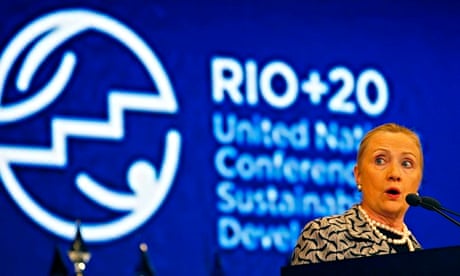Change takes time. Patience is a virtue. These are familiar words. Sometimes though, we need to speed things up and exert a little pressure so that change happens at the necessary pace. Securing long-term economic sustainability via the UN could provide a welcome shift in gears for sustainable finance.
Governments, civil society and businesses came together this week as the UN Political Forum on Sustainable Development met to review the Millennium Development Goals (MDGs) for sustainability and to determine the next steps for policy makers around the world. With the 2015 expiry date for the MDGs drawing closer, and the post-Kyoto agreement climate talks entering a crucial phase, this is a critical period.
The document that will eventually replace the MDGs will set out the UN's key performance indicators for the next 15 years. These new targets will be voluntary and aspirational, but they will focus minds, hearts and wallets of the world's governments.
The coming months represent a vital opportunity for decision-makers within the financial community to engage seriously with the task of creating a sustainable economy. The number one priority must be to address the unsustainable foundations on which the economy, and therefore, on which capital markets are built. Capital markets are phenomenally important to society, enabling specialisation and trade, and can help to provide for education, food, energy, healthcare and housing.
In 2011, Forum for the Future outlined what was needed to create a sustainable economy. This research, funded by Aviva, showed that markets allocate capital in a way that undermines sustainable development. We are damaging our atmosphere, converting more land for crops than is viable, while our oceans and forests are being exploited at unsustainable rates of consumption.
Individually, these problems are deeply concerning indicators about the status and stability of our economic development. Collectively, they are profoundly worrying signs that our economy and capital markets are on an unsustainable footing. The overriding concern for investors and insurers is the contemporary threat that these issues pose to the value of clients' assets, to financial stability and to long-term economic growth. The investment industry has a fiduciary duty to its clients and consequently it is right that we try to take action.
At the UN Rio+20 Earth Summit, a coalition of pension funds, asset managers, church organisations, charities, and professional bodies pushed participants to come to a new global agreement on corporate sustainability reporting in the form of a treaty.
In addition to this being good for sustainable development, such disclosure is in all companies' interests. Reporting helps companies to review and prioritise the most important issues for them, which is one of the most effective ways of safeguarding the long-term health of a business. It also provides investors with the data we need to carry out valuation work accurately.
Despite considerable opposition, a resolution was ultimately adopted by the UN General Assembly that included a key paragraph promoting integrated sustainability reporting. However, it included very few means of implementation. With the possible exception of the recent agreement in Europe on the non-financial reporting directive, progress has not been anywhere near as significant or as rapid as hoped.
UN policymakers must direct their focus more than ever towards the correction of market failures so that the promotion of sustainable development becomes intrinsic. This is no small task and requires a change of mind-set for many. Traditionally the UN has tended to focus on the flow of aid when considering sustainable development issues. However, looking at how the tens of trillions of private capital is allocated matters far more than how the tens of billions of dollars of official assistance is dispensed.
Aviva has presented the UN Political Forum with a set of recommendations in the form of a roadmap for sustainable capital markets. This Roadmap suggests that the UN can pick up the pace of change by:
(i) Raising capital for sustainable uses: development of internationally coordinated "capital raising plans" that make better use of the global capital in the markets in order to help develop the global economy more sustainably.
(ii) Transparency: establishment of national legislative frameworks requiring companies, investment banks, stock exchanges, asset managers, investment consultants, asset owners and proxy voting agencies to produce an integrated sustainability report to society – on a mandatory comply or explain basis.
(iii) Improve corporate governance: governments to ensure all national corporate governance frameworks promote corporate governance that integrates sustainable development.
(iv) Promote integrated financial regulation: governments to promote capital markets regulation that integrates sustainable development factors in the mandates of, for example, the supervision agencies of stewardship codes, listing rules and financial stability.
It is well within the collective ability of our governments to ensure that capital markets enhance corporate sustainability and promote long-term business behaviour. This week will determine whether or not we start moving towards this goal at a faster pace, or whether progress towards a more sustainable economy will continue to grind along in first gear.
Steve Waygood is chief responsible investment officer, Aviva Investors
The finance hub is funded by EY. All content is editorially independent except for pieces labelled advertisement feature. Find out more here.
Join the community of sustainability professionals and experts. Become a GSB member to get more stories like this direct to your inbox
